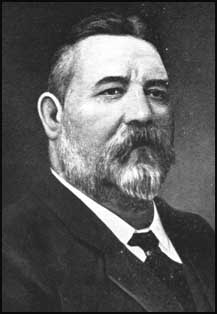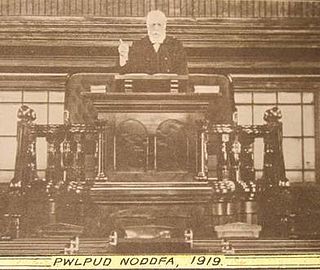
William Abraham, universally known by his bardic name, Mabon, was a Welsh trade unionist and Liberal/Labour politician, and a member of parliament (MP) from 1885 to 1920. Although an MP for 35 years, it was as a trade unionist that Abraham is most well known. Initially a pioneer of trade unionism, who fought to enshrine the principle of workers' representation against the opposition of the coal-owners, he was regarded in later life as a moderate voice believing that disputes should be solved through conciliation rather than industrial action. This drew him into conflict with younger and more militant leaders from the 1890s onwards. Although the defeat of the miners in the Welsh coal strike of 1898 was a clear defeat for Mabon's strategy, his prestige was sufficient to ensure that he became the first president of the South Wales Miners' Federation which was established in the wake of the dispute. Abraham was noted for his powerful speaking voice, and was a renowned orator in English and Welsh.

The South Wales Miners' Federation (SWMF), nicknamed "The Fed", was a trade union for coal miners in South Wales. It survives as the South Wales Area of the National Union of Mineworkers.

Thomas Richards was a Welsh trade unionist and politician.
The 1915 Merthyr Tydfil by-election was a parliamentary by-election held on 25 November 1915 for the British House of Commons constituency of Merthyr Tydfil in Glamorganshire, Wales.
The first election to the Glamorgan County Council were held on 17 January 1889. Results were announced over several days. They were followed by the 1892 election. The authority, by far the largest county in Wales in terms of population, was established by the 1888 Local Government Act. The county of Glamorgan was at this time becoming heavily industrialised although some areas such as the Vale of Glamorgan remained essentially rural.

William Morris, widely known by his bardic name, Rhosynnog, was the minister of Noddfa Baptist Church, Treorchy, South Wales from soon after its formation in 1868 until his death.
The second election to the Glamorgan County Council was held on 8 March 1892. The 1889 election was the first contest and the next was the 1895 election. Glamorgan County Council had been established by the 1888 Local Government Act, and the first election held in January 1889. Glamorgan was by far the largest county in Wales in terms of population. The county of Glamorgan was at this time becoming heavily industrialised, although some areas such as the Vale of Glamorgan remained essentially rural. The rise of nonconformist liberalism, especially since the 1860s, throughout Wales, had challenged the prevailing influence of the landed gentry. However, even in 1889, the traditional forces remained influential and no working men were elected to the Council. This changed in 1892 with the unopposed return of David Morgan in Aberdare and the success of Isaac Evans in Resolven.
Frederick Lewis Davis was a Liberal politician and a member of a notable family of coal owners in South Wales. His grandfather, David Davis, Blaengwawr was a pioneer of the coal trade in the Aberdare valley while his father, Lewis Davis and uncle, David Davis, Maesyffynnon developed the business and were pioneers of the coal trade in the Rhondda, most notably at Ferndale. Having trained as a barrister, Davis joined the family business.
David Morgan was a Welsh miners' agent and trade unionist who played a prominent role in the history of industrial relations in the South Wales Coalfield from the 1870s until his death in 1900.
The Glamorgan County Council election, 1898 was the fourth contest for seats on this authority. It was preceded by the 1895 election and followed by the 1901 election. Glamorgan was by far the largest county in Wales in terms of population. Glamorgan County Council had been established by the 1888 Local Government Act, and the first elections held in early 1889. The county of Glamorgan was at this time becoming heavily industrialised, although some areas such as the Vale of Glamorgan remained essentially rural. The rise of nonconformist liberalism, especially since the 1860s, throughout Wales, had challenged the prevailing influence of the landed gentry. However, even in 1889, the traditional forces remained influential and no working men were elected to the Council. This changed in 1892 with the unopposed return of David Morgan in Aberdare and the success of Isaac Evans in Resolven.
The Cambrian Miners' Association, also known as the Rhondda District Miners' Association, was an early trade union representing coal miners in the Rhondda Valley, in Wales.
The Monmouthshire and South Wales Miners' Association was a trade union representing coal miners in south eastern Wales.

Isaac Evans was a Welsh trade union leader and politician.
The Western Miners' Association was a trade union representing coal miners in parts of South Wales, centred on Neath.
The Anthracite Miners' Association was a trade union representing coal miners in parts of Carmarthenshire, Glamorgan and Breconshire, in South Wales.
John Davies was a Welsh politician and trade unionist, who served as Mayor of Merthyr.
The Aberdare, Merthyr and Dowlais Miners' Association was a trade union representing coal miners in part of Glamorgan in South Wales.
Hubert Jenkins was a British trade unionist and politician.

Richard James Lewis was a Welsh politician and co-operative activist.
The thirteenth election to Glamorgan County Council, south Wales, took place in March 1925. It was preceded by the 1925 election and followed by the 1931 election.






